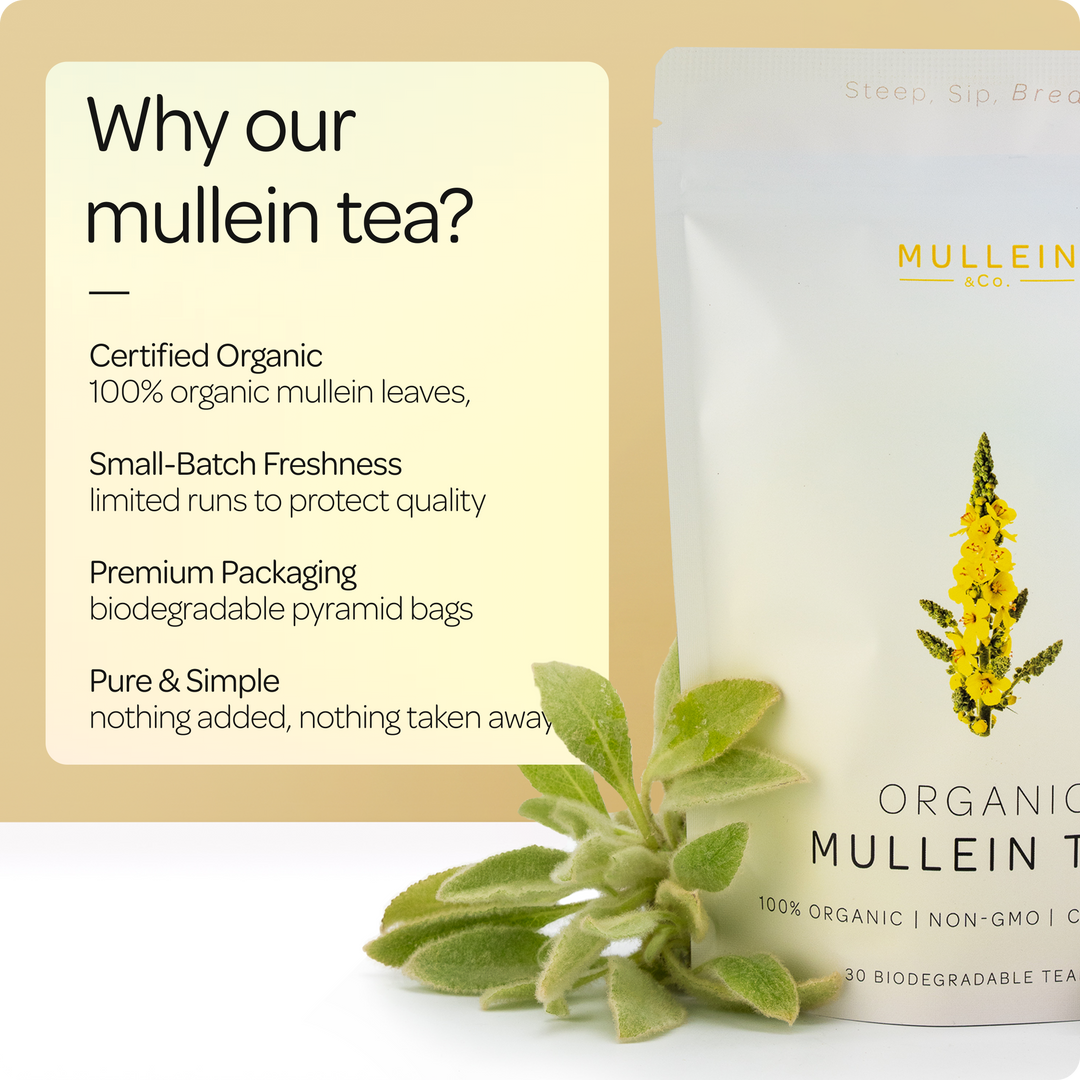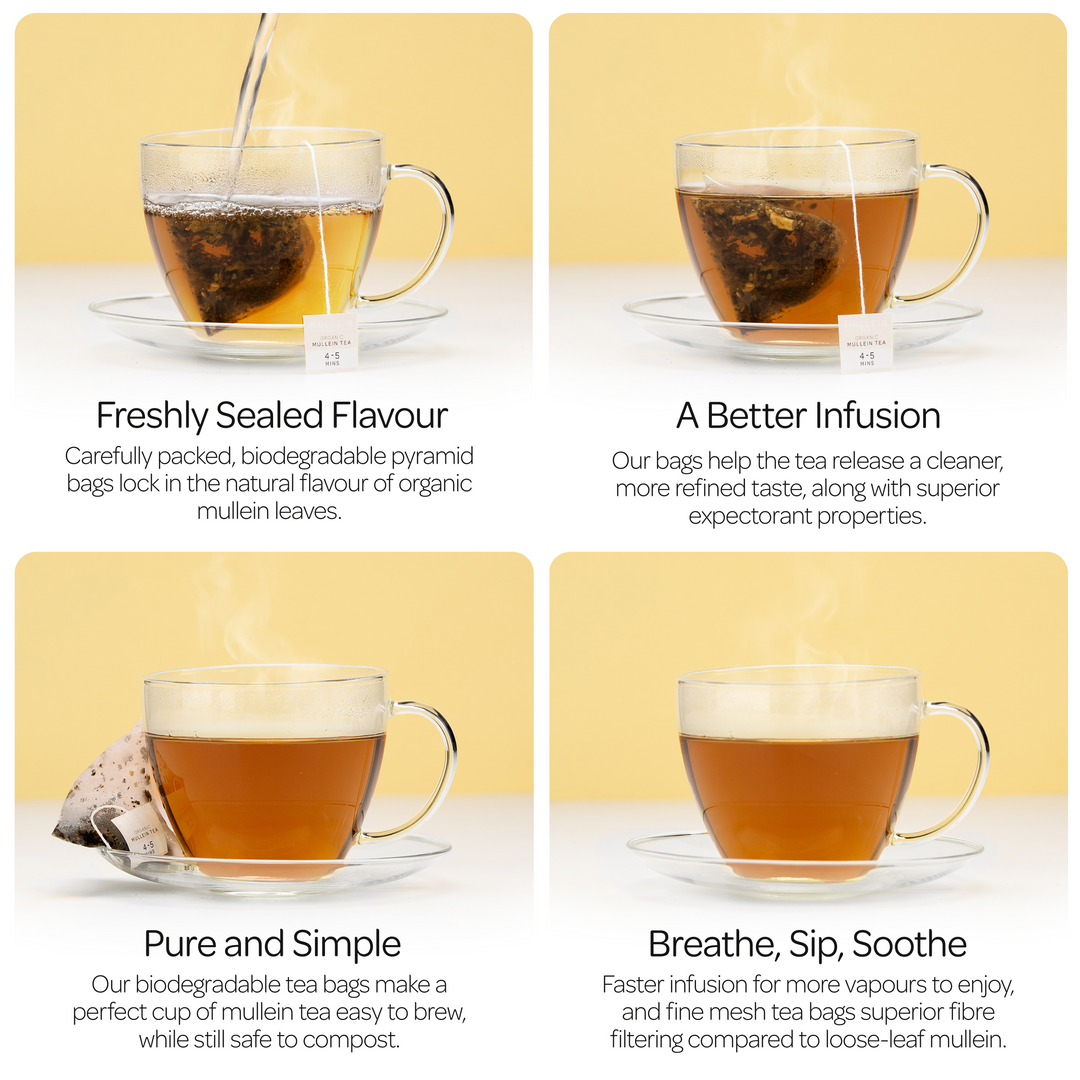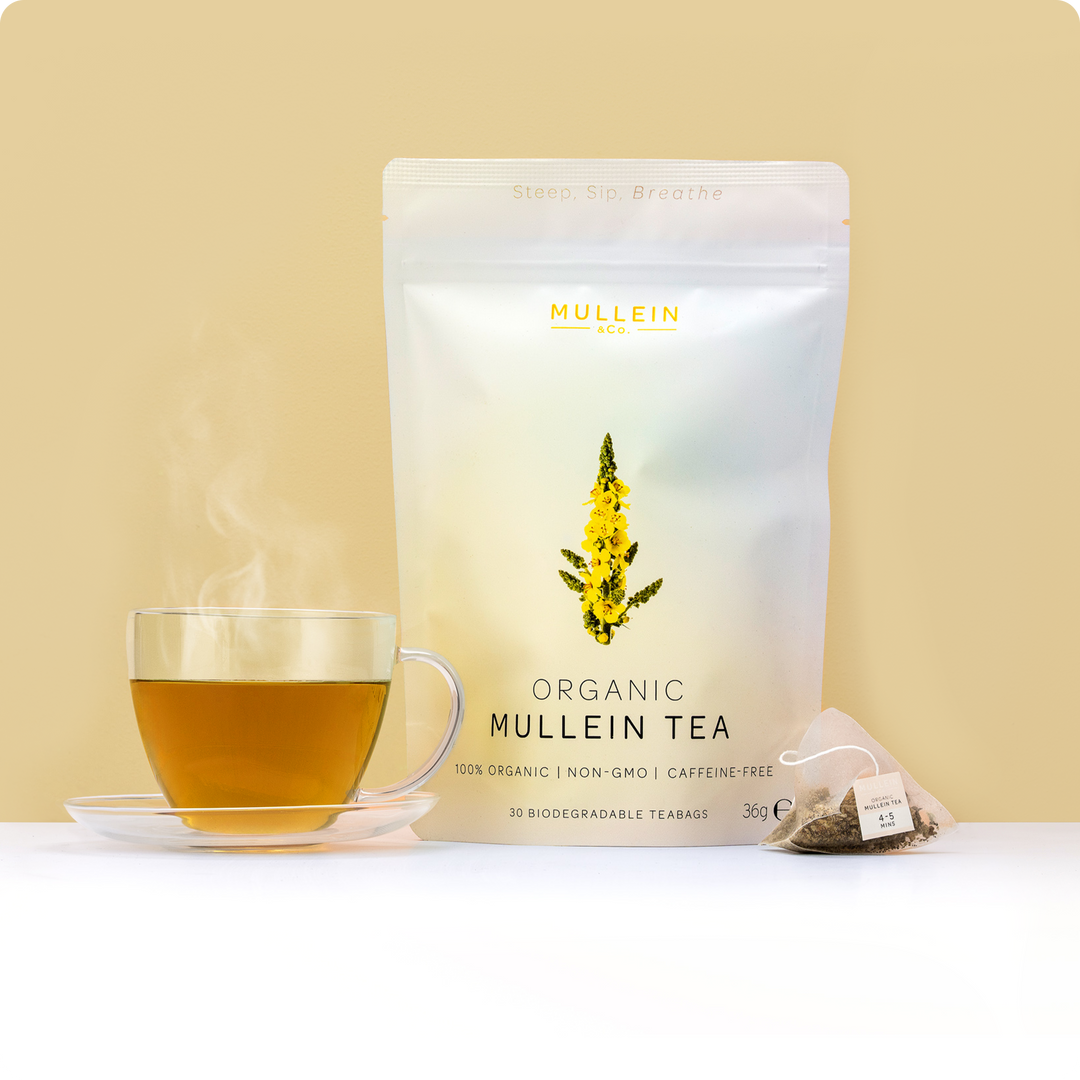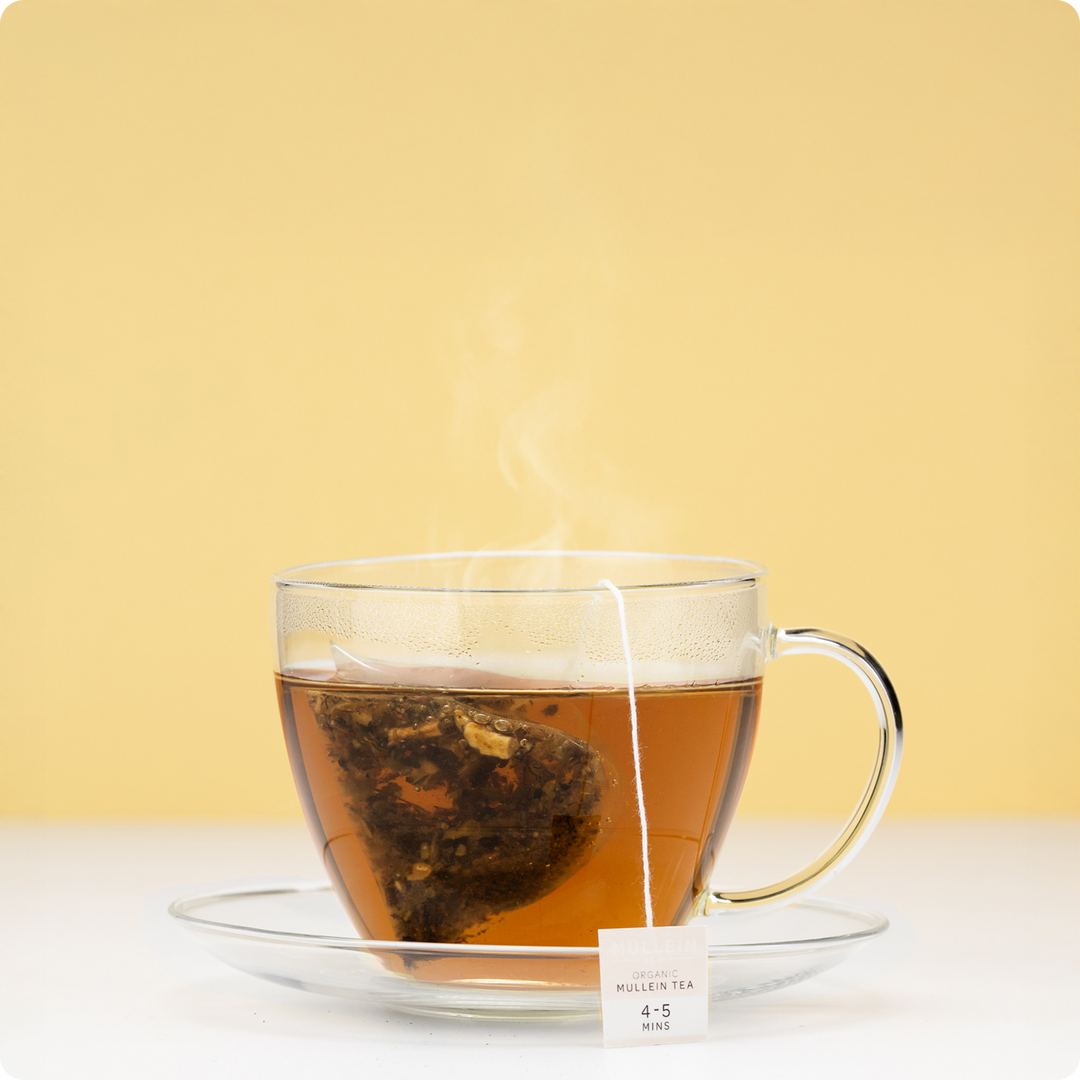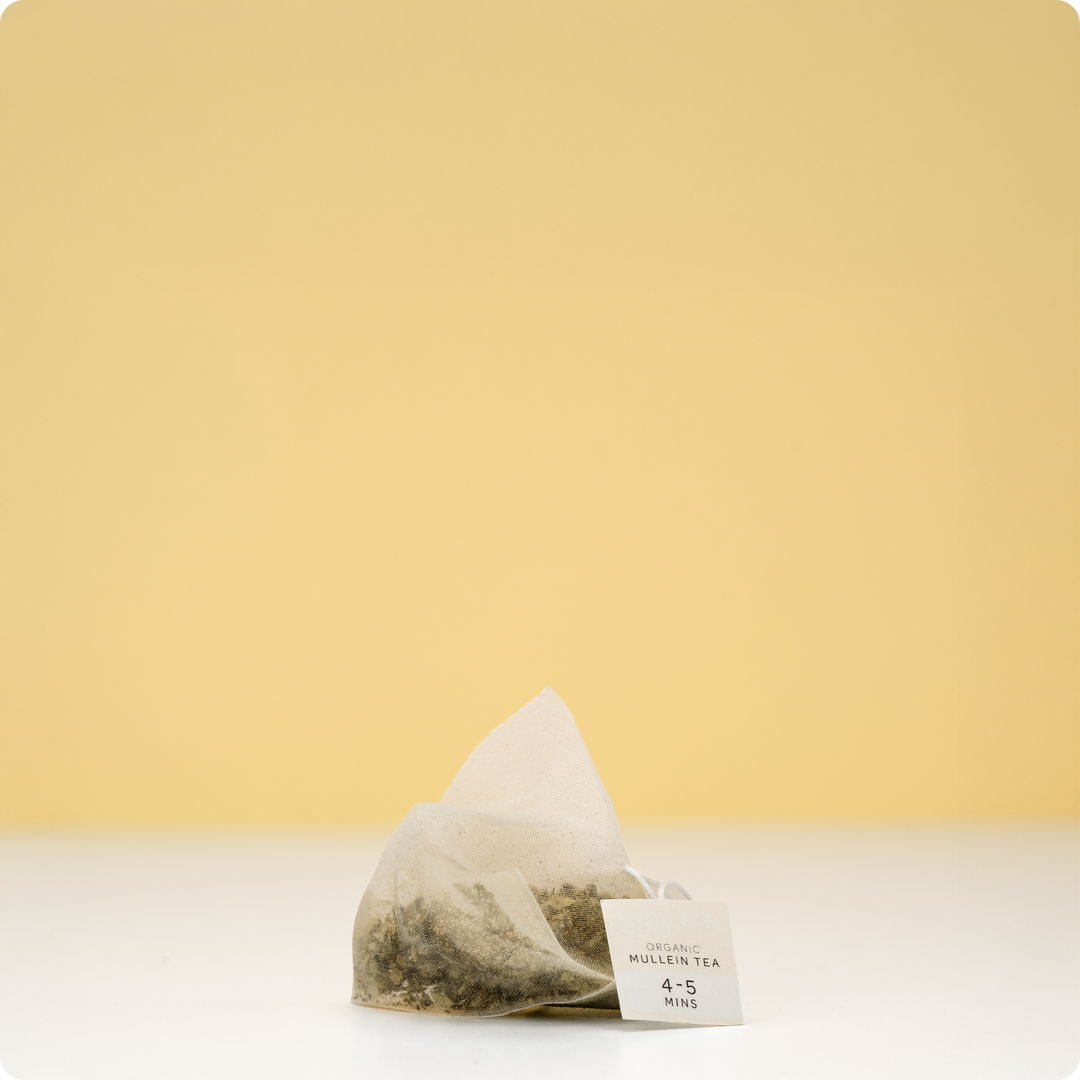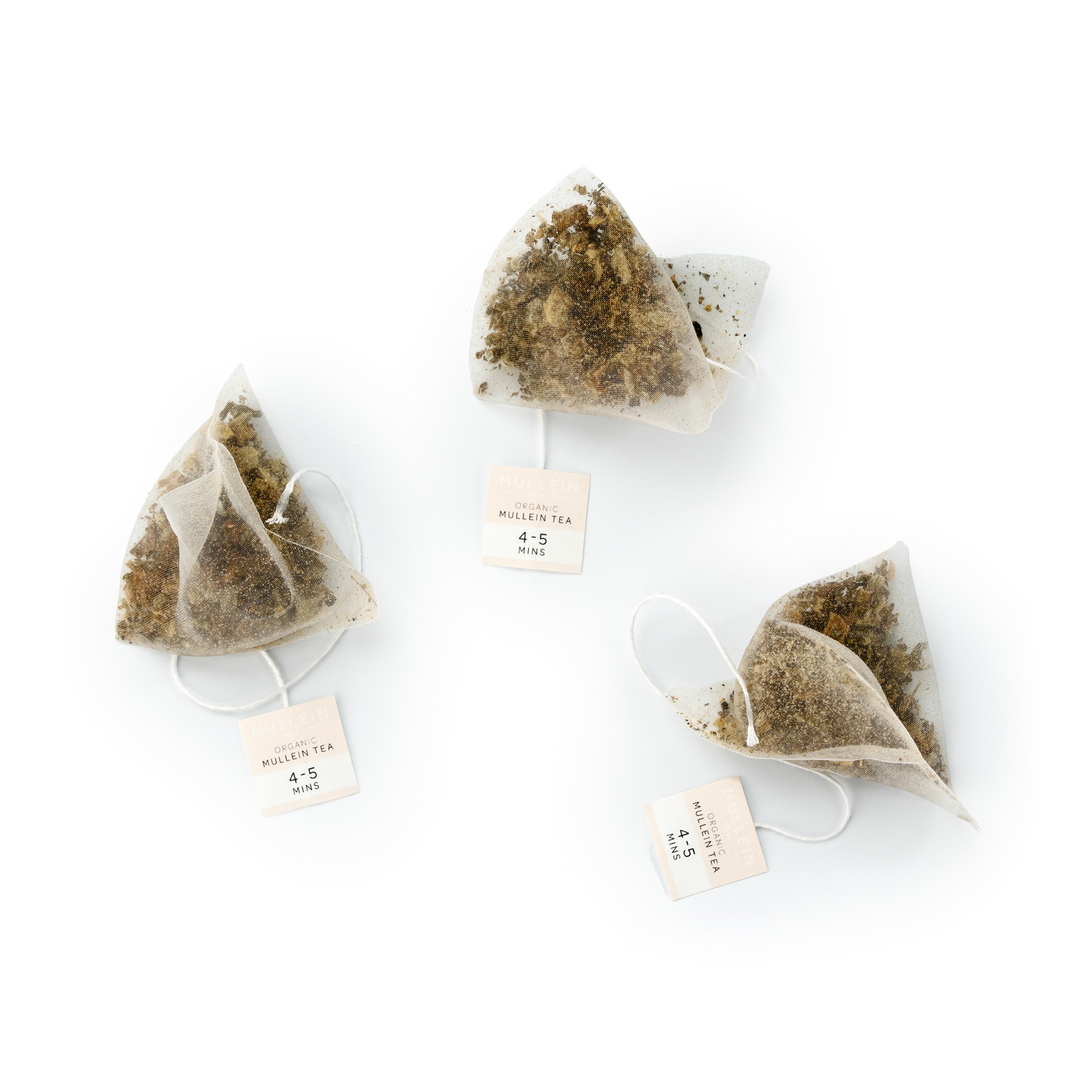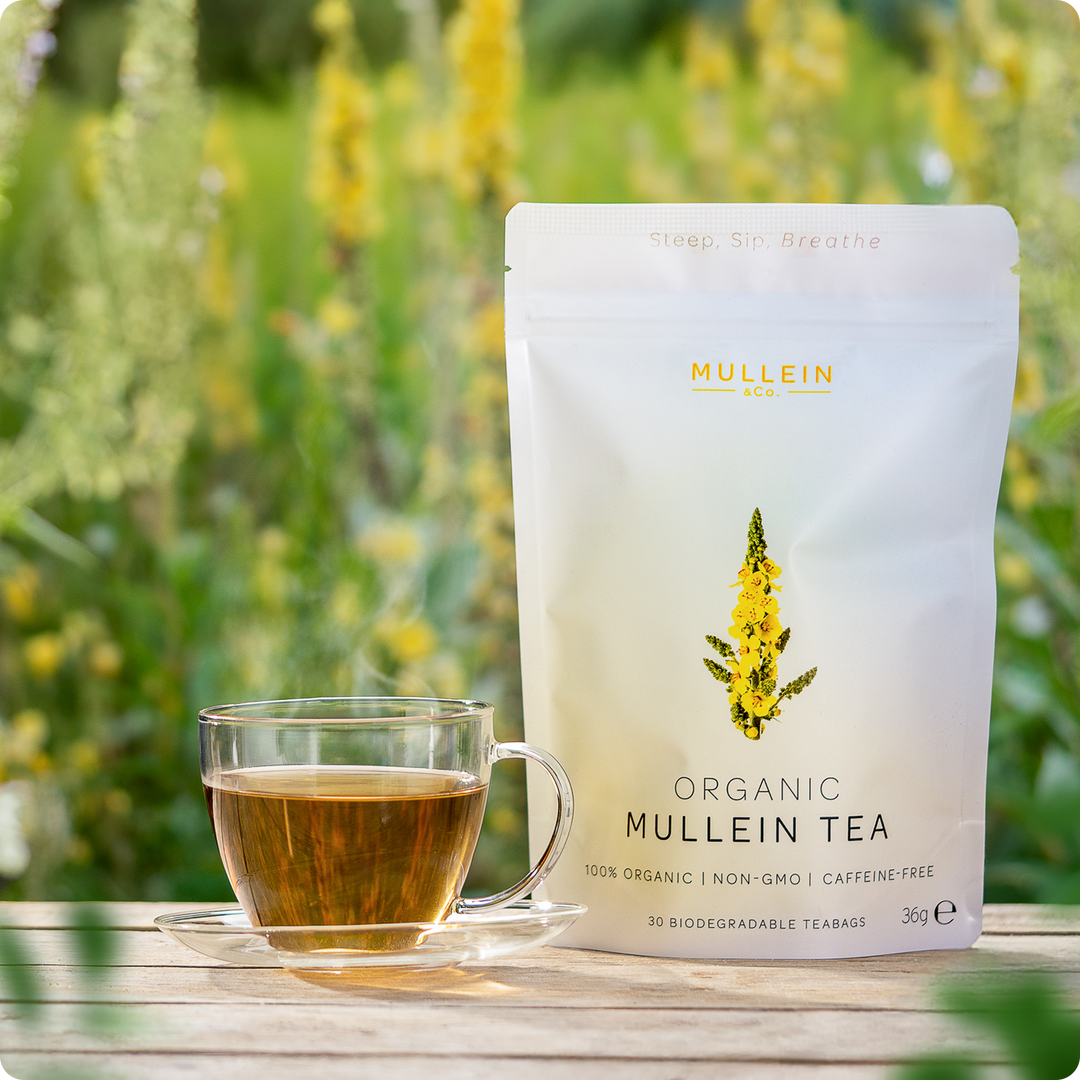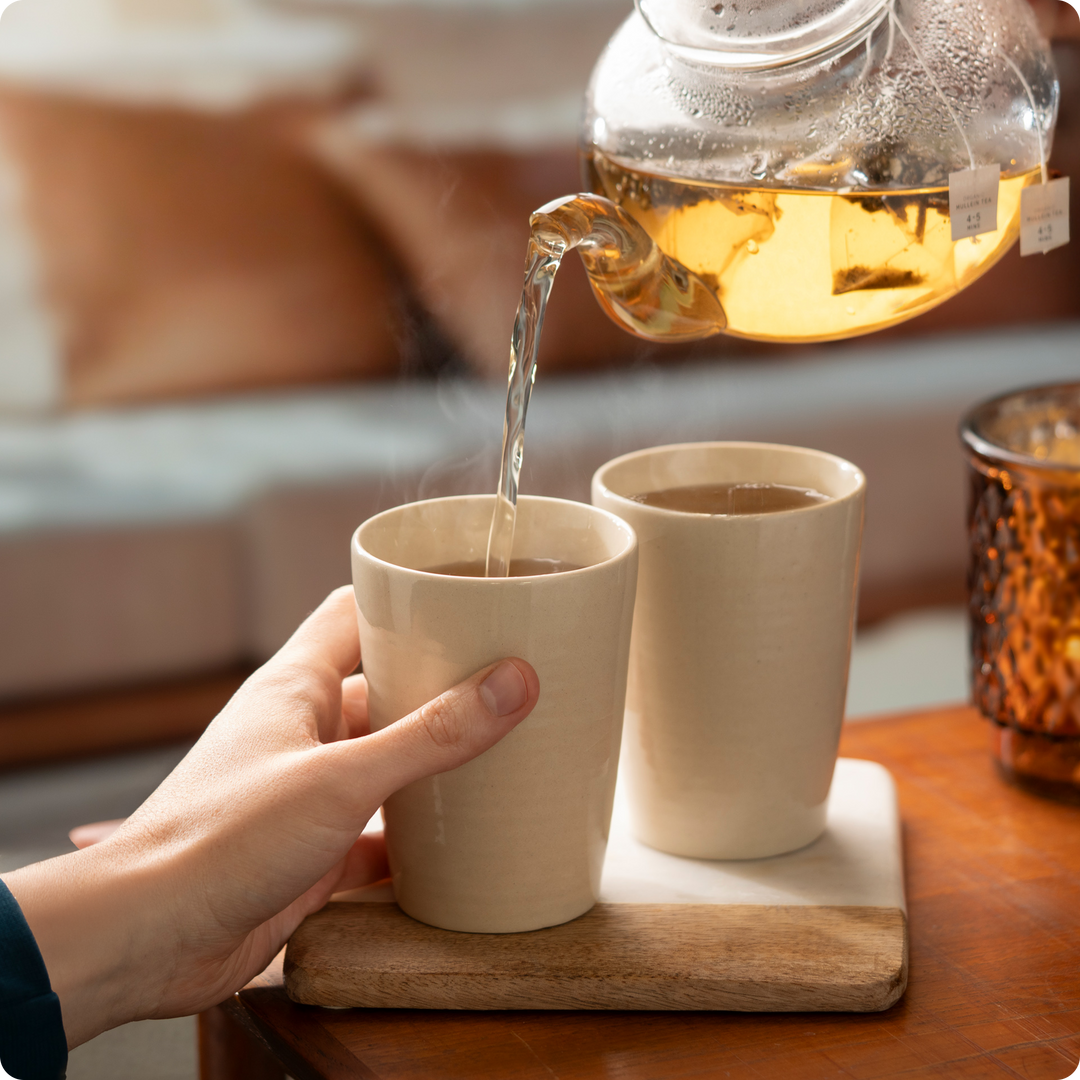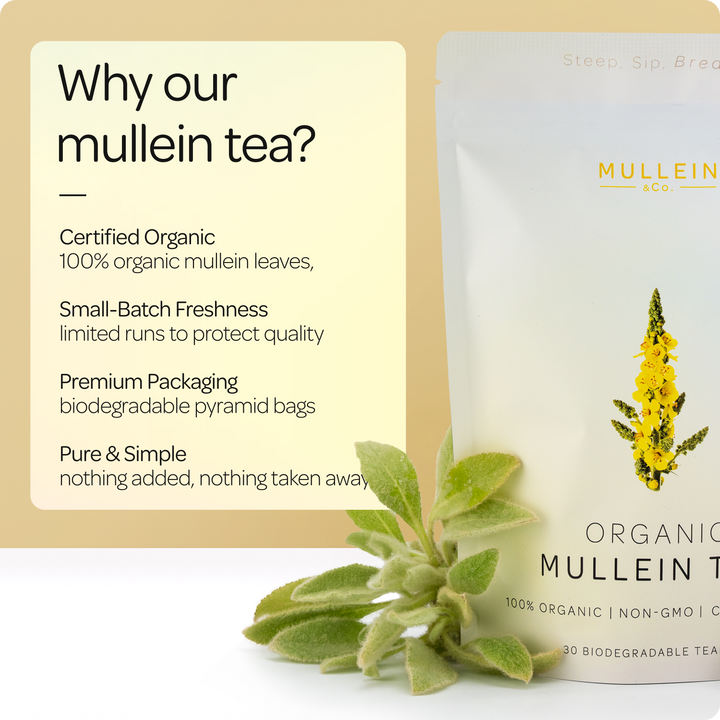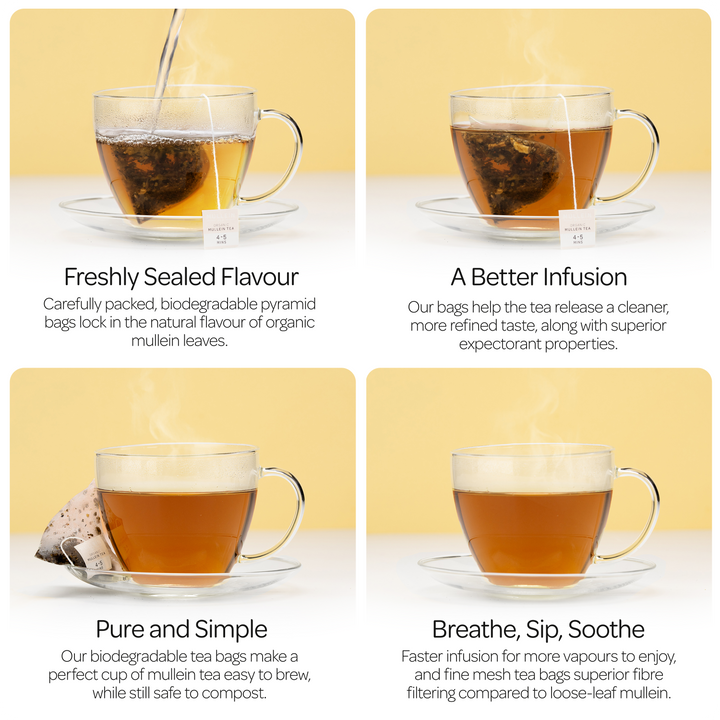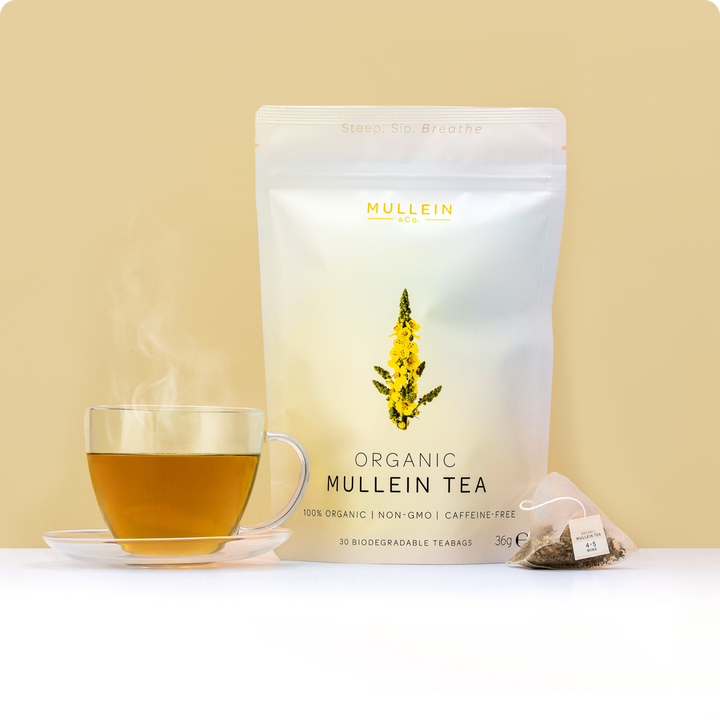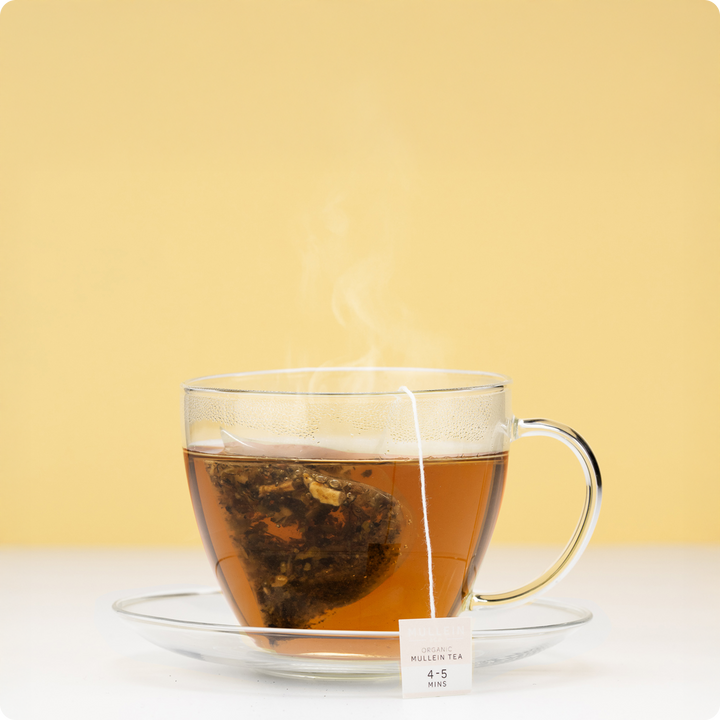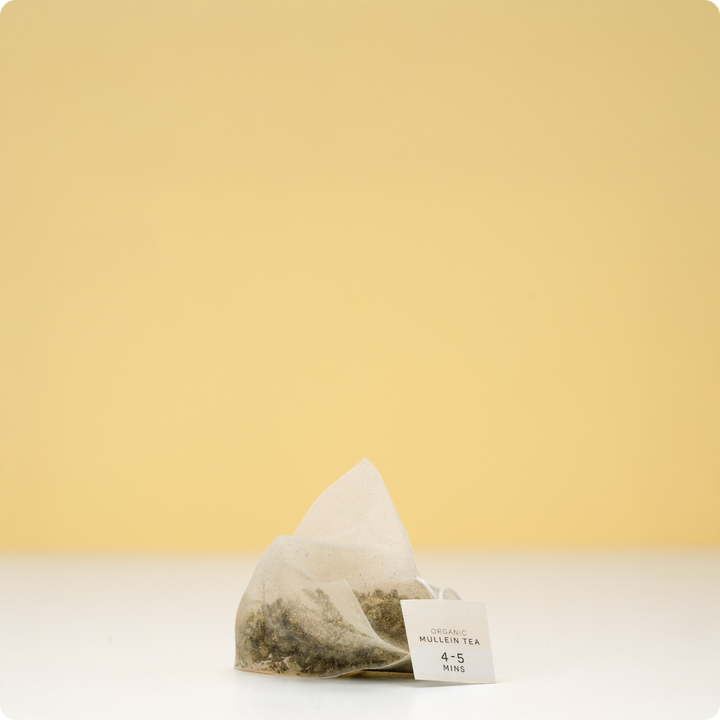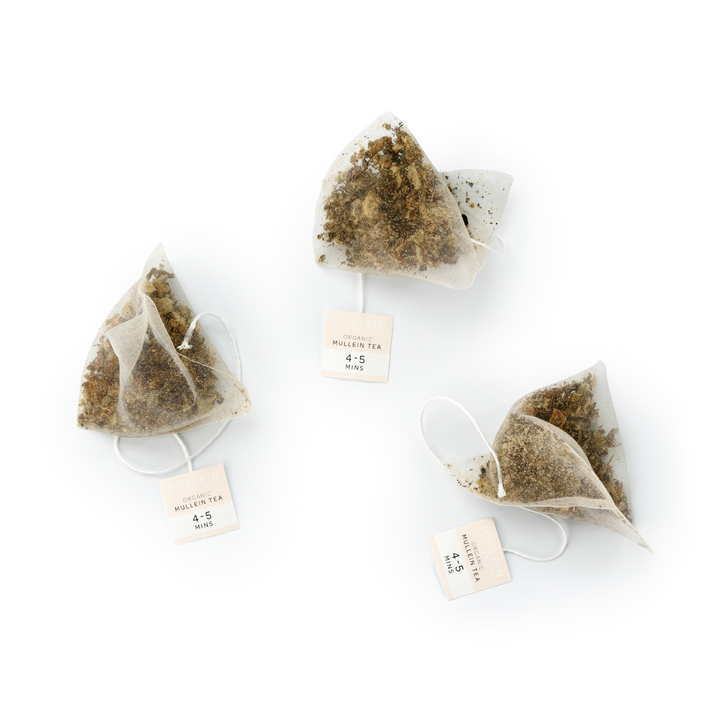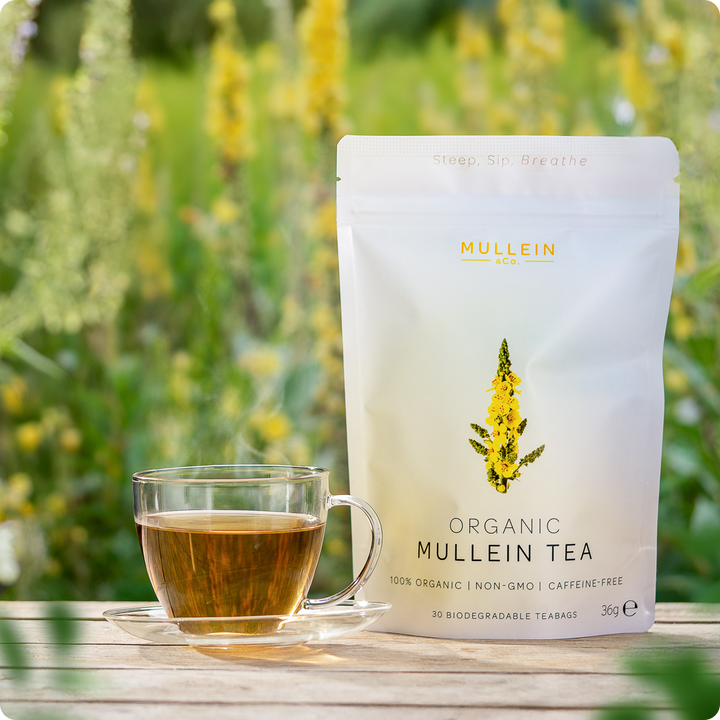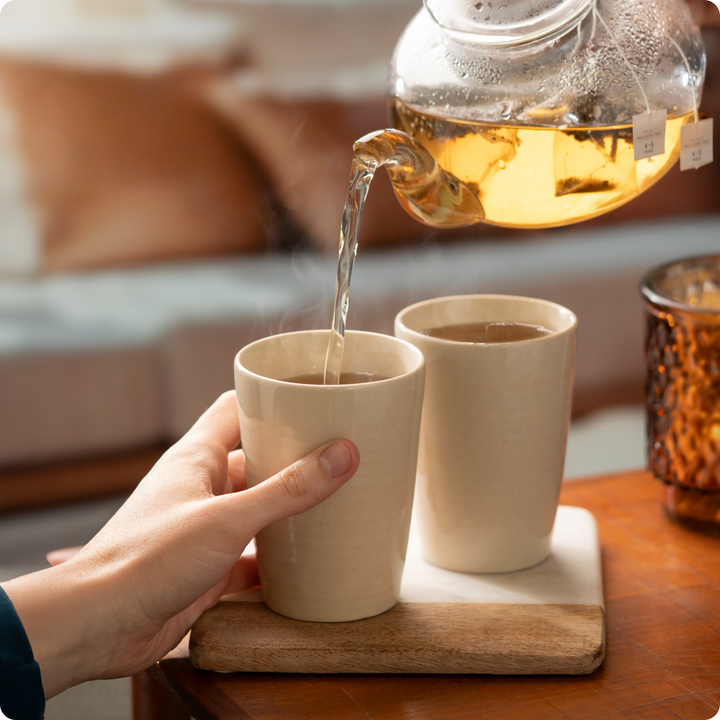Does Mullein Tea Make You Sleepy? Effects, Benefits, and Uses

If you’ve ever curled up with a mug of herbal tea before bed, you’re probably familiar with the usual suspects – chamomile, valerian, lavender. But there’s another plant quietly making waves for its night-time benefits: mullein tea. Long used as a traditional remedy, it’s often praised for its gentle, calming qualities — though its role in sleep support isn’t always clear.
Rather than acting like a knockout potion, mullein works behind the scenes. By easing coughs, soothing scratchy throats and supporting healthy lungs, it helps create the kind of comfort that makes drifting off feel natural. Think less “instant sedation” and more “breathing easy so your body can actually relax.”
So, Does Mullein Tea Make You Sleepy?
Mullein tea is often linked with relaxation and relief from coughs or congestion, but it does not act like a strong sedative. Its main role lies in easing discomfort that might otherwise keep you awake, rather than directly causing drowsiness.
Sedative Effects of Mullein Tea
Mullein tea does not contain well-known sedative compounds such as those found in valerian root or chamomile. Instead, it is best described as calming rather than sleep-inducing. The plant’s active compounds, including flavonoids and saponins, are more associated with soothing the respiratory system than altering brain chemistry linked to sleep.
You may notice a sense of relaxation after drinking mullein tea, but this effect comes from reduced irritation in your throat or chest. By easing coughing or congestion, you may feel more at ease before bed. This indirect calming effect can sometimes be mistaken for a sedative action, but it is not the same as feeling drowsy.
In short, mullein tea is not a direct sleep aid. It supports comfort and relaxation, which may help you prepare for rest without making you feel sleepy on its own.
How Mullein Tea Influences Sleep Quality
The main way mullein tea can influence your sleep is by reducing symptoms that disturb rest. If you struggle with a persistent cough, congestion, or mild inflammation in your airways, this herbal tea may help ease those issues. A clearer chest often makes it easier to fall asleep and stay asleep.
Unlike sedative herbs, mullein tea does not alter your sleep cycle. Instead, it works by creating better conditions for uninterrupted rest. For example, if you often wake up at night due to coughing, drinking mullein tea may reduce those disruptions.
You may find it particularly useful during colds, mild asthma flare-ups, or seasonal allergies. By supporting your breathing comfort, the tea indirectly improves your overall sleep quality without acting as a sleep-inducing herbal remedy.
Comparing Mullein Tea with Other Herbal Teas for Sleep
Different herbal teas have different effects on sleep. Mullein tea is mainly valued for its respiratory support, while other teas are more directly linked to sedation.
| Herbal Tea | Primary Benefit | Effect on Sleep |
|---|---|---|
| Mullein Tea | Eases coughs, clears mucus | Supports comfort, not sedative |
| Chamomile | Relaxation, mild sedation | Promotes drowsiness and calm |
| Valerian Root | Reduces anxiety, insomnia | Stronger sedative effect |
If you are looking for a tea to make you sleepy, chamomile or valerian root may be more effective. If your sleep problems stem from coughing or congestion, mullein tea may be more helpful.
This distinction is important when choosing a herbal remedy. You should match the tea to your specific needs rather than expecting all herbal teas to work the same way.
Active Compounds and Mechanisms in Mullein Tea
Mullein tea contains several plant compounds that may influence how your body responds to it. These include antioxidants, soothing agents, and compounds with mild antimicrobial activity, all of which can affect relaxation, comfort, and sleep quality in indirect ways.
Key Phytochemicals in Mullein
Mullein leaves and flowers contain flavonoids, saponins, iridoids, and glycosides. These plant chemicals play different roles in supporting your health. Flavonoids such as quercetin act as antioxidants, helping to reduce oxidative stress that can affect your overall well-being.
Saponins are known for their ability to support respiratory health by loosening mucus. This action may make breathing easier, which can be important if you struggle with congestion at night.
Laboratory studies suggest mullein also contains compounds with antibacterial and antimicrobial properties. These may help limit minor infections in the respiratory tract, although the evidence in humans is still limited.
Because of these combined actions, mullein tea is often used not only for relaxation but also for easing coughs and throat irritation.
Role of Flavonoids and Saponins
Flavonoids in mullein, including quercetin, are linked to anti-inflammatory properties. By reducing inflammation, they may help calm irritation in your airways that could otherwise disturb sleep. These compounds also act as antioxidants, protecting cells from damage caused by free radicals.
Saponins are another important group. They have a mild expectorant effect, which means they can help loosen thick mucus in the lungs and throat. This may reduce coughing and allow you to rest more comfortably.
Both flavonoids and saponins may also contribute to mullein’s calming effect. While they are not sedatives, their ability to ease discomfort and support respiratory function may indirectly help you feel more relaxed before bed.
The combination of these compounds highlights why mullein tea is often described as soothing rather than strongly sleep-inducing.
Mucilage and Demulcent Properties
Mullein leaves are rich in mucilage, a thick, gel-like substance that coats and soothes irritated tissues. When you drink mullein tea, this mucilage acts as a demulcent, forming a protective layer over your throat and digestive tract.
This coating effect can ease soreness, reduce irritation, and calm dry coughs. If coughing or throat discomfort keeps you awake, this property may help you settle more easily.
The demulcent action is not limited to the throat. It may also provide comfort in the digestive tract, which can be helpful if you experience mild stomach upset.
By reducing irritation and promoting comfort, mucilage supports the body’s natural ability to rest, making it a key feature of mullein tea’s effects.
Health Benefits Beyond Sleep
Mullein tea offers more than potential support for sleep. You may find it useful for easing breathing difficulties, calming inflammation, and addressing common health concerns through its traditional role in herbal medicine.
Respiratory Health and Mullein Tea
You can use mullein tea to support your respiratory system, as it has a long history in easing conditions such as bronchitis, asthma, COPD, and coughs. The mullein leaf and flowers contain compounds that help loosen and clear mucus, making it easier to breathe.
This expectorant effect is why mullein tea is often chosen as a natural aid for chest congestion. By helping to clear the airways, it may provide comfort when you are dealing with respiratory ailments that cause irritation or blocked breathing.
Some studies suggest that mullein extract may reduce irritation in the throat and airways. While research is still developing, many people use mullein leaves in tea as a gentle herbal remedy for ongoing lung and breathing issues.
Anti-Inflammatory and Antibacterial Effects
Mullein contains anti-inflammatory compounds that may help reduce swelling and irritation in the body. This can be useful if you are managing problems linked to chronic inflammation, such as sore throats or irritated airways.
In addition, mullein has shown antibacterial and antimicrobial properties in laboratory studies. Extracts of the plant have been found to act against bacteria such as E. coli, Staphylococcus aureus, and Bacillus cereus. These findings suggest mullein may play a role in easing mild bacterial infections.
Some research also points to antiviral activity, including effects against the influenza virus. While this does not make mullein a cure, it highlights its potential as a supportive herbal option when you want to strengthen your body’s natural defences.
Traditional Uses in Herbal Medicine
In traditional medicine, mullein has been valued for centuries as a versatile herbal remedy. You may come across its use for respiratory conditions, ear infections, and skin irritations. The mullein leaves and flowers have been prepared as teas, oils, and extracts depending on the need.
For ear discomfort, mullein flower oil has been used as a topical treatment. For coughs and congestion, mullein leaf tea has been a common choice in herbal medicine cabinets.
These traditional uses of mullein reflect its reputation as a plant that supports both internal and external health. While modern research continues to examine its effects, its long-standing role in herbal medicine shows why it remains a popular natural option.
Where to Buy Quality Mullein Tea
Because mullein is having a moment right now, you’ll see it everywhere – loose leaves, tea bags, even tinctures. But not all mullein is created equal. The way it’s grown, harvested and stored makes a huge difference to its potency (and to how smooth it tastes).
Choosing the Good Stuff
If you’re going to drink mullein tea for its soothing, lung-loving benefits, you might as well make it the best you can get. Look for certified organic, non-GMO tea made from 100% mullein leaf (Verbascum thapsus) with nothing sneaky blended in. Organic suppliers follow stricter growing and processing standards, which means fewer pesticides, fresher flavour and more of the plant’s natural goodness in your cup.
That’s exactly why we created Mullein & Co. 100% Organic Mullein Tea. Our leaves are hand-picked at peak potency, carefully air-dried and packed in biodegradable pyramid bags so you get a pure, clean brew without the mess. It’s caffeine-free, smooth on the throat and an easy way to support clear breathing as part of your daily routine.



